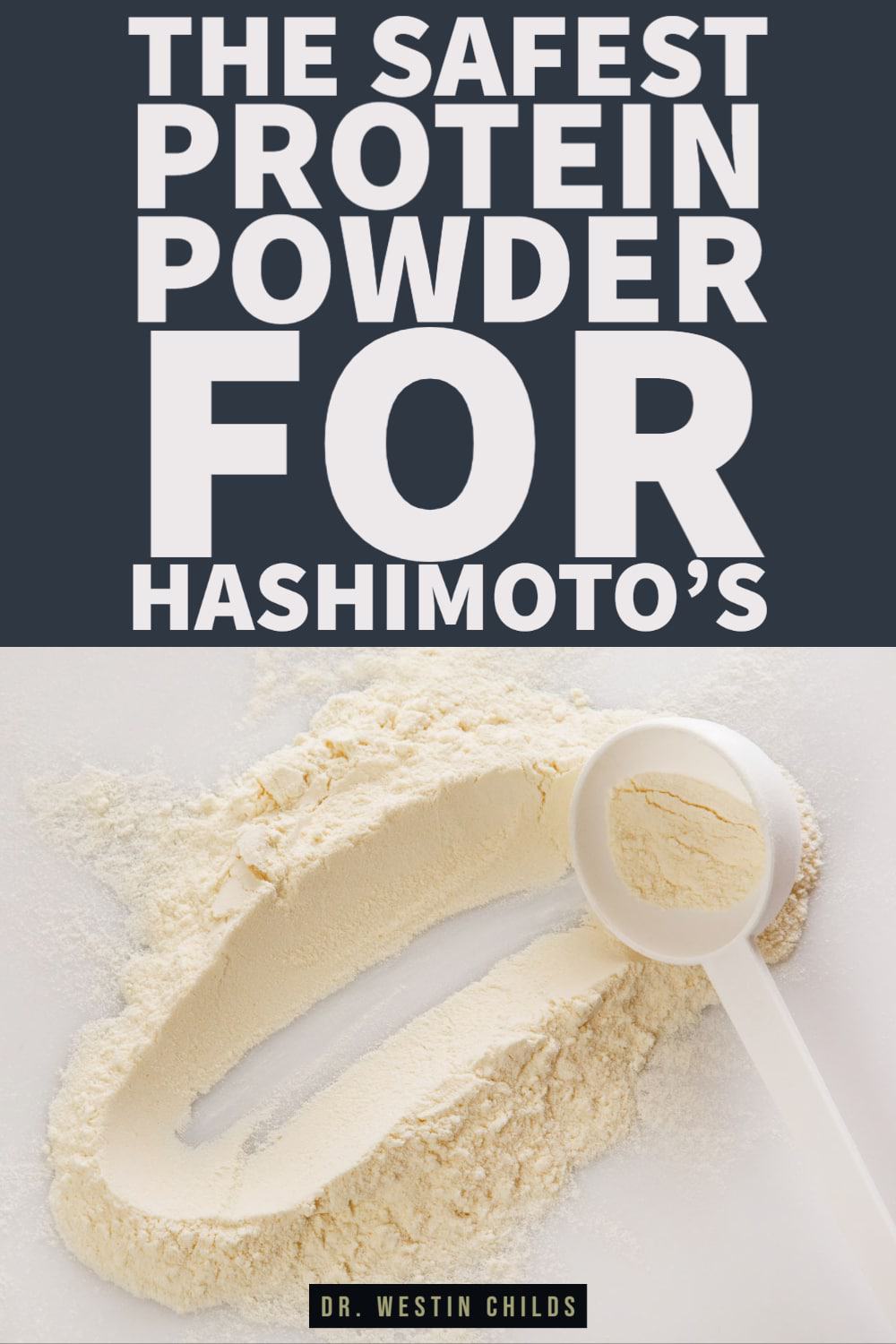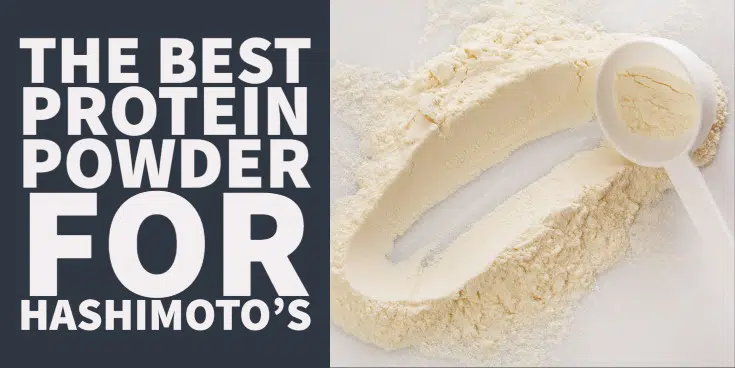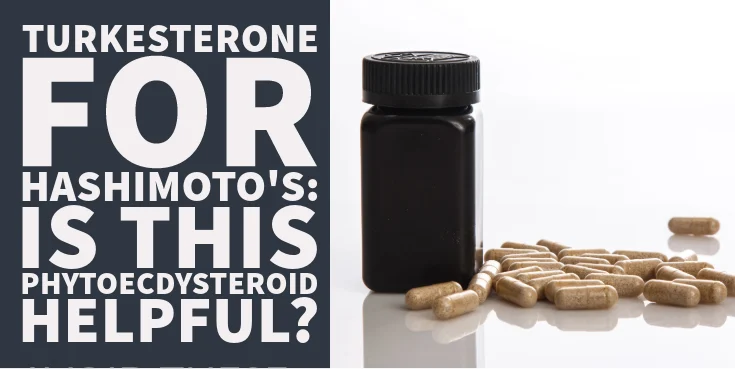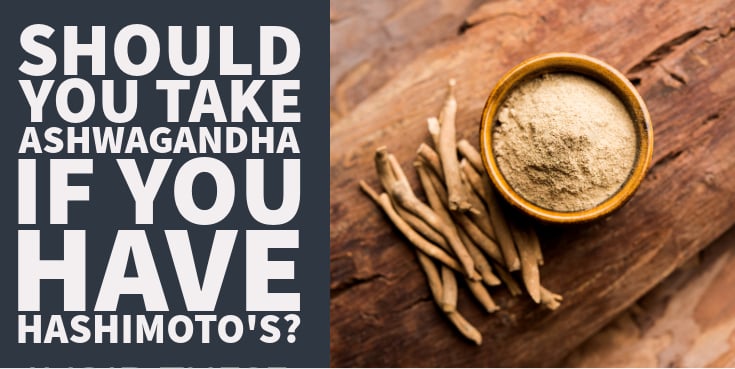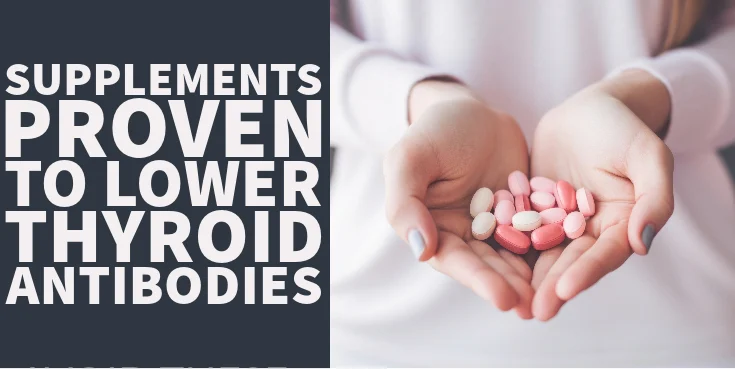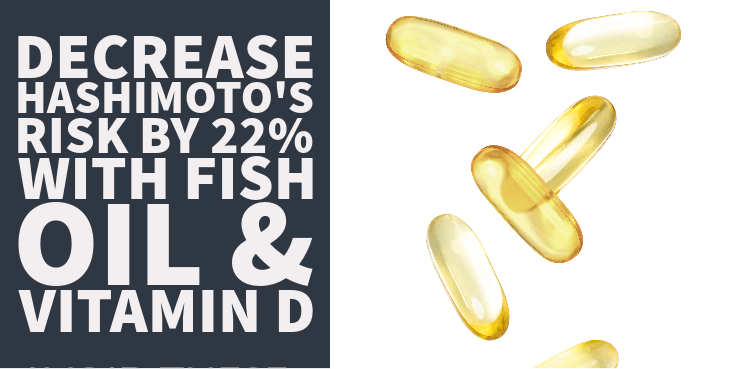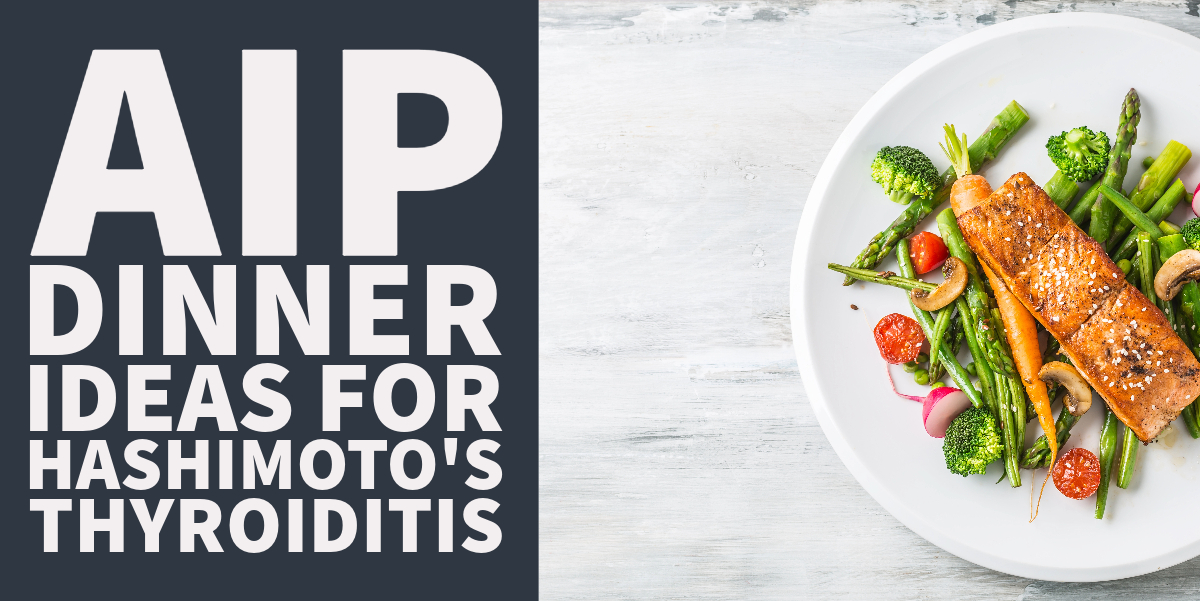Protein Powders Are Great For Patients with Hashimoto’s
There are too many benefits of using protein powder to ignore and it’s something that pretty much every patient with Hashimoto’s (or thyroid disease of any type) should consider.
With that in mind, it makes sense that if you are going to use it that you want to use the right type to get all of these benefits.
What benefits am I talking about?
Well, here are a few:
- Protein powder can help you lose weight (1) – Protein powder is one of the easiest supplements to take to help manage your weight. Because patients with Hashimoto’s thyroiditis struggle with weight gain, using protein powder for this purpose is a no-brainer.
- It provides you with a quick and easy meal so you can stay on track with your dietary goals – Eating a healthy diet is important for everyone but it’s especially important for those with Hashimoto’s! Eating the right type of foods can help reduce inflammation and balance your immune system and the opposite is true if you are eating the wrong types of foods. Taking protein powder each day makes staying on your healthy diet much easier because it removes one meal that you need to worry about.
- It helps control your appetite (2) – Protein as a macromolecule has a profound impact on regulating your appetite. You can strategically use protein powder to help manage cravings and curb your appetite.
- It’s an easy way to get extra nutrients into your body – Patients with Hashimoto’s often struggle with many nutrient deficiencies. It’s easy to throw extra vitamins, nutrients, and botanicals into a protein powder to help you reduce how many supplements you need to take each day.
- It’s easy to prepare and tastes great – Lastly, protein powders (the good ones) taste great and are really easy to prepare!
For purposes of this article, we aren’t focusing on the benefits of protein powder as much as we are on the types of protein powders available, but it’s worth mentioning them here just to give you a reminder of why you want to use it if you aren’t already.
Before you run out and grab some random protein powder, let’s make sure you are using the right type.
After all, using the wrong type of protein powder can easily cause more harm than good.
Today you will learn:
- The 3 major types of protein powders available to patients with Hashimoto’s
- The pros and cons of each type
- Why whey protein can be both harmful and beneficial to patients with Hashimoto’s
- Why the amino acid blend of your protein powder matters
- When to consider using hydrolyzed beef protein powder
- And much more
Let’s jump in…
DOWNLOAD FREE RESOURCES
Foods to Avoid if you Have Thyroid Problems:
I’ve found that these 10 foods cause the most problems for thyroid patients. Learn which foods you should avoid if you have thyroid disease of any type.
The Complete List of Thyroid Lab tests:
The list includes optimal ranges, normal ranges, and the complete list of tests you need to diagnose and manage thyroid disease correctly!
3 Main Types of Protein Powders to Consider
As you will soon find out, there are many types of protein powders available.
In this article, we will be primarily focusing on 3.
Why?
Because these are the most common and the ones that patients with Hashimoto’s tend to migrate towards.
They are also the ones that are most readily available and tend to provide the best benefits.
As you will see, choosing the best protein powder for your body isn’t as easy as it might sound.
Each type of protein powder contains pros and cons and each of these needs to be evaluated before making a choice.
As we go through this article, I am going to explain these pros and cons and when to consider certain types of protein powders.
In the end, I will provide you with some general advice as well as what I generally recommend for patients with Hashimoto’s.
Whey Protein for Hashimoto’s Thyroiditis
First up we have whey-based protein powders.
These are definitely the most common types of protein powders on the market and are frequently used by bodybuilders and people trying to lose weight.
If you walk into your grocery store (or local supplement store) you are sure to find plenty of whey-based protein powders.
Even though they are popular among the normal population, whey protein powders tend to get a negative reputation among patients with Hashimoto’s because they are dairy-based.
Whey is one of the primary proteins found in dairy products and is a byproduct of the cheese-making process (3).
If you’ve spent any time learning about Hashimoto’s then you are probably well aware that dairy can be a big no-no for patients with Hashimoto’s.
Dairy has the potential to exacerbate immune problems (4) and may, therefore, make Hashimoto’s worse.
Having said all of this, there may still be some redeeming qualities to whey protein which is why we need to look at the pros in context with the cons.
Pros of whey protein for Hashimoto’s:
Pro #1. Results in an increase in Glutathione
There seems to be something special about whey protein powder in that it can result in a natural increase in glutathione.
I didn’t believe this at first but after some research, this is definitely the case (5).
This has the potential to be a huge positive for patients with Hashimoto’s because glutathione is the primary mechanism by which your body protects your thyroid gland from inflammation and damage.
In fact, patients with Hashimoto’s often go out of their way to take supplements that contain glutathione!
This benefit most likely stems from the blend of amino acids found inside whey protein.
The ratio of certain amino acids likely provides just the right building blocks for your body to produce glutathione.
Even though this is true, whey protein also has the potential to cause issues.
So whether or not the benefits of glutathione production outweigh the cons will need to be determined on an individual basis.
Pro #2. Lowest calorie per protein compared to other protein powders
Another benefit to whey protein powder is that it has the lowest calorie per gram of protein compared to other protein powders.
Put simply:
Whey protein allows you to get the most protein at the lowest caloric cost.
As a rough estimate (though this value can change based on many factors), you can get about 20 grams of protein for around 90 to 100 calories of whey protein or 20 grams of protein for around 120 to 140 calories of plant protein.
While not a huge deal, this can be important for patients with Hashimoto’s who are also struggling with weight gain (a very common side effect of low thyroid function).
The small difference in calories between 20 grams of whey protein per serving and 20 grams of plant protein per serving is not huge, but it can add up if you are using 2-3 servings of protein powder per day.
For most people, this won’t matter but if you are using multiple servings of protein powder each day it may slowly add up.
Pro #3. It is rapidly digested and easily absorbed by the body
Whey protein, by virtue of its processing, is both rapidly absorbed and digested by the body.
This is both good and bad.
Good in the sense that you can be sure that the protein you are consuming is getting into your body and bad in the sense that you want to avoid heavily processed foods if you have Hashimoto’s.
Whey can come in concentrates, isolates, and hydrolysates and each of these formulations will vary in terms of how well they are absorbed.
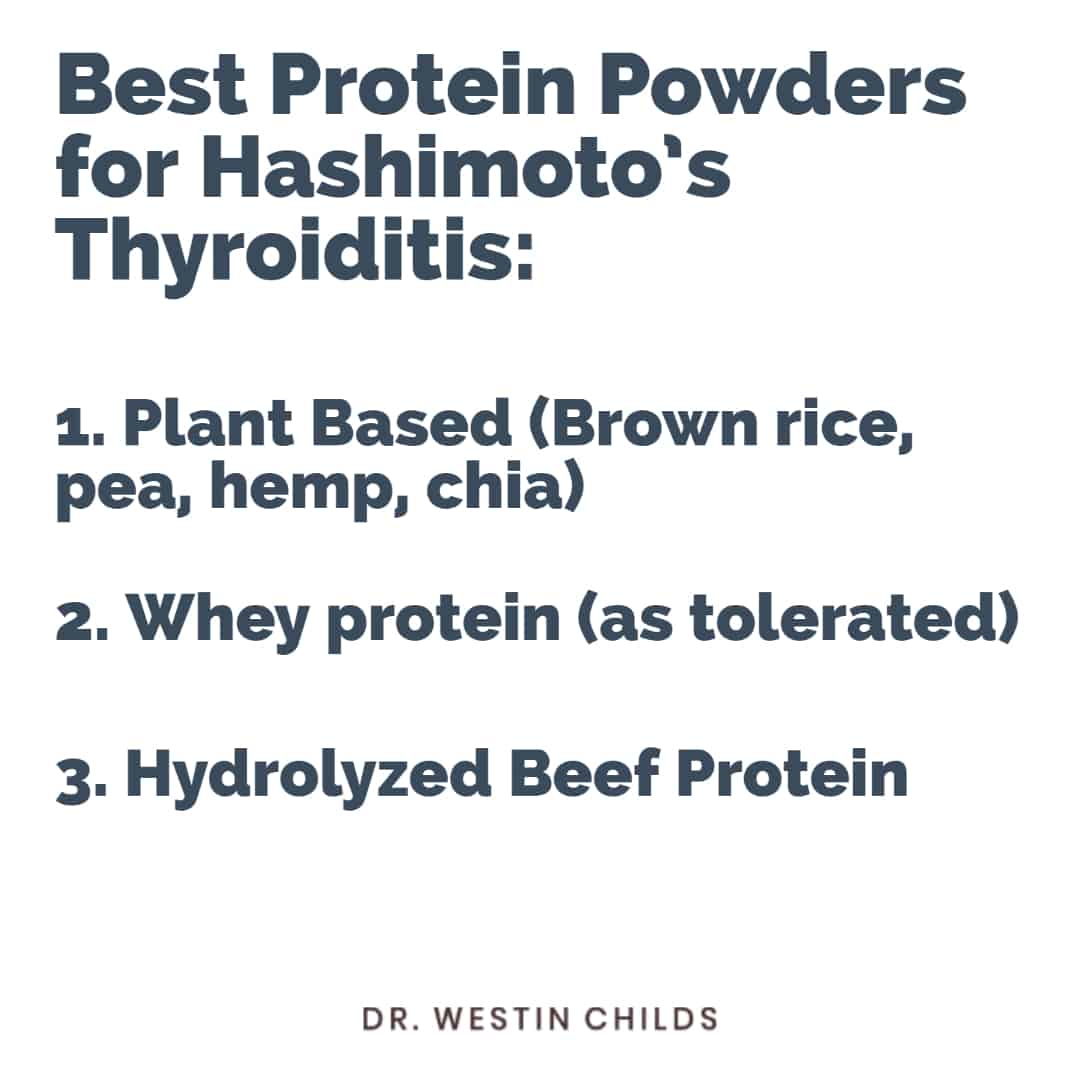
It is felt that the isolates and hydrolysate forms are better absorbed than the concentrates.
One benefit to the processing of whey is that the processing may help to remove a substantial amount of lactose (6).
Unfortunately, this doesn’t apply to all forms of whey and even with the processing, some lactose may remain.
But it can make a difference if you are only marginally impacted by lactose.
Pro #4. It has a better taste profile compared to other protein powders
Another huge benefit is that many people are already used to the taste and flavor of whey!
This matters because you really should enjoy the protein powder you are using.
If you don’t enjoy it, or if you don’t like the taste, then you are less likely to use it consistently and, therefore, less like to obtain the benefits you want!
Because whey is dairy-based it also tends to go well with flavors that taste similar to ice cream and other types of dairy products.
This can be both a good and a bad thing, though, as you will soon find out.
Pro #5. It is rich in the amino acid leucine
Lastly, whey protein is rich in specific types of amino acids.
The one we care about for this discussion is leucine.
Leucine is an amino acid that plays a role in helping your body build lean muscle mass (7).
Those people who use protein powder are typically doing so to be healthy, to help with weight loss, and to help build muscle mass.
Whey protein contains an abundance of amino acids which help with these exact things.
Cons of whey protein for Hashimoto’s patients:
Con #1. Hashimoto’s patients may be sensitive to whey
We spent a lot of time evaluating the pros of whey protein but we must put those pros into context with the cons to get a full picture.
Perhaps the biggest downside to whey protein is that it may cause immune problems in patients with Hashimoto’s.
This immunogenic response stems likely from the dairy proteins found inside of whey.

Certain patients with Hashimoto’s experience inflammation (8) and, therefore, thyroid gland damage when using dairy products.
This isn’t universal, though, which is why whey may have a place for SOME patients with Hashimoto’s.
You definitely do not want to take whey protein (even with all of the benefits) if it makes your Hashimoto’s worse. Period.
Con #2. May cause gut discomfort
Next up, whey protein can cause a lot of gut discomfort including things like gas, bloating, stomach distention, pain, and even acid reflux.
It is felt that these symptoms likely stem from lactose (due to lactose intolerance) found in whey protein.
The issue with lactose doesn’t explain every case, though, as there are many forms of whey that have minimal lactose content but still cause these issues.
This means that some people just can’t tolerate whey protein for other reasons that we probably do not fully understand.
If you take whey protein and you notice any of these symptoms then that’s a sign you shouldn’t be taking it!
Con #3. Not all forms of whey protein are created equal
As mentioned above, there are many types and formulations of whey protein.
Some of these formulations are cheap and require extra processing by the body.
If you choose to use whey protein but use a cheap formulation of whey, you may experience negative side effects with minimal benefit.
If you opt to try whey protein as a patient with Hashimoto’s, then you will want to make sure you get an isolate or hydrolysate form and ensure that most or all of the lactose has been removed to give your body the best shot.
Con #4. Many contain inactive ingredients such as dyes and fillers
Lastly, whey protein powders, on average, tend to contain more inactive fillers, dyes, colorants, and binders, compared to plant-based protein powders.
If you ever go to the grocery store to look for whey protein powders then you will know what I’m talking about.
It’s not uncommon to find whey protein powders flavored in similar ways as breakfast cereals.
You can imagine that it takes a significant amount of work in the form of artificial flavors, dyes, and fillers to get there.
Unfortunately, these added inactive ingredients may cause issues for patients with Hashimoto’s and should be avoided if possible.
You can still find some clean versions of whey protein on the market, though, so if you want to try and use whey look for a clean version that is not artificially flavored and one that does not contain these fillers or binders.
Plant Protein for Hashimoto’s Thyroiditis
Most patients with Hashimoto’s are very familiar with plant-based types of protein powders because they are frequently recommended by integrative and functional-minded practitioners.
When I reference plant-based protein powder, for purposes of this article, I am really talking about brown rice and pea protein powders.
These are the most common types but you can get plant protein from other sources such as chia, hemp, pumpkin, soy, and various other blends or combinations of these.
When thinking about using plant protein or not, you should always take into account the other ingredients you are getting along with it.
For instance, if you are getting your protein from hemp then you should realize that hemp protein will tend to have more fat in it compared to brown rice protein.
That’s because hemp naturally contains more fat than brown rice.
In addition, each form of plant-based protein powder will vary in its caloric content per gram of protein, in how well it is absorbed, in how it tastes, and in how it feels in your mouth.
The pros and cons listed below apply primarily to pea protein and brown rice protein.
Pros of plant protein for patients with Hashimoto’s:
Pro #1. Usually well tolerated by patients with Hashimoto’s
If you were to line up 100 patients with Hashimoto’s and give all of these patients both whey protein and plant protein, you would find that, on average, most patients would do better on the plant protein.
And by do better, what I really mean is that they would have fewer side effects, experience more benefits, and be more likely to use the plant protein long-term.
This is probably because plant protein powders do not contain dairy proteins or dairy sugars so you don’t need to worry about immunogenic reactions from the proteins or reactions to lactose like you would with whey protein.
Having said that, plant proteins can still cause issues with gas and bloating as we will soon discuss.
Pro #2. Usually well absorbed
Another benefit is that plant-based protein powders are still very well absorbed much like their whey counterpart.
They are probably not absorbed to the same degree as certain isolates of whey protein but even Hashimoto’s patients with gut issues are still able to obtain benefit from these powders.
Pro #3. The amino acid blend is close to that of whey
Lastly, the amino acid blend found in plant-based protein powders is similar to that of whey (9).
You should care about the amino acid blend of whatever protein powder you are taking because it certainly has an impact on what type of benefits you may experience.
In the case of whey, some of the benefits such as the increase in glutathione most likely stem from its unique amino acid composition.
In addition, its benefits on muscle building probably stem from its high content of leucine.
If we place whey protein as the amino acid blend standard then plant proteins do hold their own.
Their amino acid blend isn’t quite the same but it does come close in terms of variety and concentration, at least enough to provide benefits even if not to the same degree as whey.
Pro #4. Pea protein is usually cleaner compared to whey protein (free of inactive ingredients)
For the most part, you can consider pea protein powders to be cleaner (on average) compared to whey protein powders.
This isn’t universally true, of course, but if you were to randomly grab a pea protein off of the shelf and a whey protein off of the shelf, you would find that the pea protein would have fewer inactive dyes and fillers.
Most people searching for plant-based protein powder are doing so because they are looking for a cleaner product and probably are aware that dairy-based whey protein powders can cause issues.
The manufacturers of pea protein powders know this and have created their products accordingly.
Cons of plant protein for patients with Hashimoto’s:
Even though pea protein powders are usually well tolerated by patients with Hashimoto’s, doesn’t mean that they will work for everyone!
Before using them consider these cons:
Con #1. The taste can be an issue, especially if you are used to whey protein powders
This is unfortunate but true.
The simple fact is that pea protein powders do not taste as good as whey protein powders!
If you’re like me then this may not be a big deal but it is for some people which is why it’s included here.
It is very important that you not only tolerate your protein powder but that you enjoy it.
If you aren’t enjoying it then you are less likely to use it every day.
For this reason, taste and texture are both important.
Pea protein powders tend to have a more chalky texture and are usually not as sweet as whey protein powders.
It’s relatively easy to make whey protein powder taste similar to ice-cream but it’s not very easy to do that when your base flavor is that of peas or rice.
You can become accustomed to the taste and texture of pea protein powder over time, though, so keep that in mind if you don’t initially like the flavor or texture.
Con #2. Plant protein contains more calories per gram of protein
Next up, you should know that many types of plant proteins contain more calories per gram compared to whey.
Again, this isn’t always an issue but it can come into play in those people who are using 2-3 scoops of protein powder each day.
Con #3. Plant protein may come from a GMO source
Lastly, because plant-based protein powders come from plants, you have to pay attention to the source.
The base plant ingredient may be genetically modified which may negate some of the benefits that you are trying to get when using plant protein.
If you are someone who is trying to avoid inactive binders, fillers, dyes, and artificial colors then you are also probably the type of person that would be interested in avoiding GMO products.
It doesn’t make sense to go through the trouble of finding a clean plant-based protein powder only to find out that the main ingredient is genetically modified.
You can avoid this problem by sticking to organic protein powders or ensuring that the source of the plant protein is non-GMO.
Hydrolyzed Beef Protein Powder for Hashimoto’s
Last up we have hydrolyzed beef protein powder.
This is NOT the same thing as collagen but it does come from a beef source.
This type of protein powder has become popular among patients with autoimmune thyroiditis because it is 100% AIP compliant.
AIP (the autoimmune protocol) restricts the use of certain ingredients and, as a result, both pea and whey protein are not permitted.
If you are trying to stay AIP compliant then using hydrolyzed beef protein powder is one of your main protein powder options.
But what exactly is hydrolyzed beef protein powder?
I spent a lot of time researching it and I am still not 100% sure of the protein source.
You might think based on the name that hydrolyzed beef protein powder contains protein from the muscles of cows but that doesn’t seem to be the case.
Instead, it appears that the protein powder in hydrolyzed beef does come from a beef source but appears to be from a blend of ingredients including those parts of the cow which are undesirable for eating.
Pros of hydrolyzed beef protein powder for patients with Hashimoto’s:
Pro #1. It is both paleo and AIP friendly.
There are many patients with Hashimoto’s who have had great success in using the AIP diet to help manage their thyroid antibodies.
I’m personally not a huge fan of the AIP diet in treating Hashimoto’s but it certainly has its place and it can be effective.
If you are someone who is strict in keeping to this type of diet then your best option for protein powder would be a hydrolyzed beef version.
As a quick aside, I personally haven’t seen a big issue for those people who are following the AIP diet but using plant-based protein powders like pea protein.
It shouldn’t cause any issues but you should be aware that pea protein would technically not be allowed if you are strictly following an AIP diet.
Pro #2. It may be ideal for those with multiple food intolerances
Next, if you are someone with multiple food intolerances then using something like a hydrolyzed beef protein powder may be your only option!
Believe it or not, there are many people who can’t tolerate dairy and many people who can’t tolerate peas or other plants such as pumpkin, hemp, chia, and so on.
If you are one of the unlucky few who can’t tolerate these foods then hydrolyzed beef may be your best and only option.
Cons of hydrolyzed beef protein powder for patients with Hashimoto’s:
Con #1. It is the most expensive per serving of all protein powders.
When it comes to cost, hydrolyzed beef protein powder is usually the most expensive compared to other protein powders.
The pricing per gram of protein usually starts with whey protein at the cheap end, then moves to plant protein powders in the middle, and finally hydrolyzed beef protein powders as the most expensive of the three.
Having said that, price is a tricky thing when it comes to your health.
I’m a firm believer that you should invest and be prepared to spend money on your health if what you are doing moves the needle and helps you to feel better.
It’s difficult to quantify or put a price on having more energy and living your best life.
But, if the high expense isn’t necessary or is only providing minimal benefit, then it may make more sense to place your investment elsewhere.
As with anything in life, you will need to figure out if the expense is worth it for your specific situation.
Just realize that you are paying a premium when you purchase hydrolyzed beef protein powder and could potentially be getting a cheaper source of protein.
Con #2. It is animal-based so it’s not ideal if you are avoiding beef due to religious reasons or due to allergies.
This one is pretty self-explanatory.
If you are avoiding beef for religious purposes or because you are allergic to it then you wouldn’t want to use this form of protein powder!
Con #3. The taste and mouthfeel are different compared to both plant and whey protein powders.
I’ve had the advantage of using many types of protein powders over the years including hydrolyzed beef.
I can tell you from experience that it tends to have a strange mouthfeel and taste compared to both whey protein and plant protein powders.
Whey protein usually dissolves the best of the three, followed by plant protein powder, and finally hydrolyzed beef.
If you are using something like a blender and putting your protein powder in a smoothie then the taste and mouthfeel aren’t a huge issue.
But if you are using your protein powder in just plain water then you may notice the difference.
Con #4. The source matters!
Whenever you are getting any ingredient from an animal you need to pay attention to the source!
The animal that you are consuming is a product of its environment, the food it was fed, its living arrangement, and so on.
All of these impact the quality of the animal product you are consuming.
For this reason, you need to make sure that your source is being treated correctly!
When it comes to beef products, check to see what country the beef is being sourced from and whether or not mad cow disease is prevalent there.
For reference, Argentina and New Zealand are two countries that have great practices when it comes to managing livestock.
If the source of your beef comes from these two countries then you can rest assured that you are getting a quality product.
Other countries will need to be evaluated on a case-by-case basis, however.
Tips to Help you Find the Best Protein Powder
Hopefully, you aren’t feeling confused right now and instead have a better appreciation for what it takes to find the best protein powder for your body.
If you’re feeling a little confused then allow me to provide some general guidance:
- Most patients with Hashimoto’s thyroiditis do VERY well with plant-based protein powder and this is usually the best place to start.
- If you know for sure that you can tolerate dairy and that your antibodies are controlled then trying whey protein may be worth a shot.
- If you are strictly following the AIP diet and trying to get your antibodies under control then using hydrolyzed beef protein powder may be ideal.
In addition to this guidance, here are some guidelines that you can use to help you avoid potentially harmful ingredients commonly found in some protein powders:
- If you have Hashimoto’s then make sure your protein powder is gluten-free, dairy-free, and soy-free.
- Avoid protein powders with artificial sweeteners and stick to powders that are sweetened with stevia or monk fruit.
- Avoid anything with artificial flavorings!
- Avoid protein powders with chemicals or preservatives that have been added to manipulate the mouthfeel or the taste of the product.
- Avoid protein powders with dyes, colorants, fillers, or binders.
- If you can’t pronounce the ingredients on the back of the label of any product then don’t put it into your body.
Wrapping it up
Protein powders can provide a lot of different benefits to patients with Hashimoto’s ranging from dietary control to weight loss and more.
To get these benefits, though, you must make sure you are using the right type of protein powder.
For most patients with Hashimoto’s, that means using a plant-based protein powder like pea protein or brown rice protein.
For others, that may mean whey protein or hydrolyzed beef protein.
The key is to find the protein powder that works for you while avoiding ingredients that may cause more inflammation and more harm to your immune system.
Now I want to hear from you:
Were you aware of the benefits of protein powder for those with Hashimoto’s?
Are you currently taking or using protein powder? If so, which type are you using?
Have you tried using whey protein powder before? Did it work for you?
Have you had any negative reactions when using plant protein powders?
Leave your questions or comments below!
